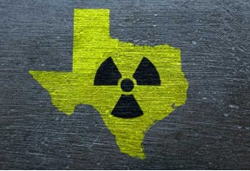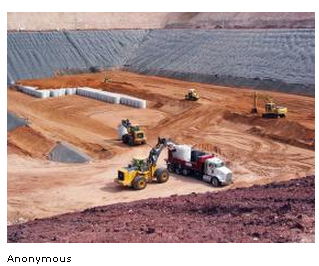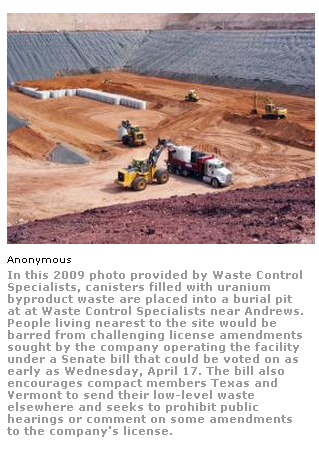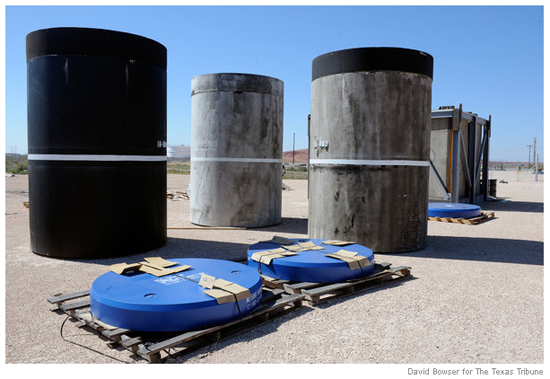Archive for the ‘Toxic Waste Dump’ Category
Fools Rush In
Legislators consider bringing high-level radioactive waste to Texas.
February 26, 2014
by KAREN HADDEN
Fort Worth Weekly

The Texas Legislature will hold hearings this year on the supposed benefits of our state storing the very hottest type of radioactive waste. Only political greed overriding common sense could account for such a stupid idea.
Where does the greed come in? Radioactive waste barons are among the largest political donors to Gov. Rick Perry, Atty. Gen. (and gubernatorial candidate) Greg Abbott, and many Texas legislators.
The House has charged the Environmental Regulation Committee with investigating this topic. The study itself is alarming enough, but consider this: The committee is supposed to look into rules regarding disposal of high-level radioactive wastes and the “potential economic impact” of allowing that kind of operation in Texas. But where is the direction to the committee to also study the risks to Texans’ health via water and air pollution, leakage, transportation accidents, and, yes, terrorism? There is no such requirement.
High-level radioactive waste includes spent nuclear reactor fuel rods and reprocessed spent fuel, which can contain plutonium, americium, cesium, strontium, iodine-129, and more. Without protective gear, even short-term exposure to the rods can be lethal. Human exposure can cause cancer, birth defects and genetic damage.
Just look at the ongoing battle to prevent global contamination from Japan’s Fukushima 4 reactor. High-level radioactive waste will remain dangerous for hundreds of thousands of years.
Most states would fight to stop such dumping, and Texas has done so in the past. Deaf Smith County was previously considered as a geologic repository site, but opponents successfully raised concerns about risks to the Ogallala Aquifer. The decision to locate that dump at Yucca Mountain in Nevada was political, based on faulty science. After decades of research and more than $10 billion of taxpayer money, development of the site was finally halted in 2010.
Now the Obama administration wants to get the idea moving again. The commission created at the president’s behest produced a report in 2012 that is a road map to developing another site. Look out, Texas! The Department of Energy is looking for a new sucker.
Texas leaders oppose every other idea the Obama administration has, so why would they consider this one? See “political donors,” above.
No doubt we’ll hear myths of how safely radioactive waste can be brought in and glowing (so to speak) tales of how rich we’ll all get, but only private companies would reap profits, while Texans bear the economic, health, and environmental costs.
Experience shows that we can’t trust federal or state agencies to protect us from radioactive risks.
The DOE touts the success of the federal Waste Isolation Pilot Project site near Carlsbad, N.M., which stores plutonium. The site was recently evacuated when a truck caught fire underground. High levels of radiation were reported inside the facility. Texas doesn’t need nightmares like this.
In 2009 the Texas Commission on Environmental Quality licensed Waste Control Specialists to operate a “low-level” radioactive waste dump in Andrews County. The company’s owner, the late billionaire Harold Simmons, was Perry’s second-largest donor and over the years gave $2 million to Abbott.
Is it any wonder that TCEQ licensed the waste dump over the objections of its own scientists, who warned about water sources being too close to the waste? TCEQ recently relaxed its earlier safety requirement that the site be dry up to 150 feet from where waste is buried; now burial is allowed even when there is standing water nearby. Other “low-level” radioactive waste sites have leaked, resulting in billion-dollar cleanup costs.
So what should be done with high-level radioactive waste? Spent fuel rods must first be cooled for several years in a pool but later can be stored in hardened casks at the reactor sites where they were generated. There’s no need to move them before Congress determines a permanent geologic disposal site. We shouldn’t risk shipping dangerous radioactive materials across the country via railroads and highways such as I-20 and I-30.
Our legislators should respect Texas and our land. It’s wrong to treat Texas as a nuclear dumping ground, to consider our deserts a wasteland, and to risk our water. No thinking Texan wants to deal with the permanent, horrific damages to our health and our economy that could occur.
State Representatives Chris Turner and Jason Villalba serve on the Environmental Committee that will hear this issue. Tell them and other committee members not to dump or store dangerous high-level radioactive waste in Texas! And stay up to date on these hearings via the NukeFreeTexas website.
Karen Hadden is the director of the Sustainable Energy & Economic Development (SEED) Coalition.
Bill would stop New Mexico residents from challenging Texas waste dump
April 16, 2013
By Asher Price, Staff
Austin American-Statesman

In this Oct. 14, 2009, photo provided by Waste Control Specialists, canisters filled with uranium byproduct waste are placed into a burial pit at a site in Andrews County. People living nearest to the site would be barred from challenging license amendments sought by the company under a Senate bill that could be voted on as early as Wednesday. (AP Photo/Waste Control Specialists, File)
The Sierra Club’s efforts to thwart a radioactive waste dump in West Texas could be derailed if a Panhandle state senator succeeds in blocking residents of New Mexico from challenging it in Texas courts.
The proposal by state Sen. Kel Seliger, R-Amarillo, might get a vote on the Senate floor this week. It could effectively cut off the Sierra Club’s challenge to a radioactive waste site in Andrews County, just miles from the New Mexico border, owned and operated by Waste Control Specialists.
The Sierra Club sued in 2009, asking for a contested case hearing on behalf of its members who live in Eunice, N.M., just west of the state line.
Contested case hearings amount to minitrials in which members of the public and others with standing can protest a permit. The judge overseeing the hearing makes a recommendation to the Texas Commission on Environmental Quality.
In 2012, a state district judge granted a contested case hearing, based on issues raised by the Sierra Club’s New Mexico members. That decision has been appealed to a state district court of appeals.
Seliger’s proposal faced tough questions at a Senate Natural Resources Committee meeting in late March.
"Why would we limit affected parties to three sides and not the fourth?" state Sen. Robert Duncan, R-Lubbock, asked Seliger, referring to New Mexico residents, who actually live much closer to the facilities — within a few miles —than virtually any Texans.
"Folks who live in New Mexico still have access to federal courts for any remedy they want," said Seliger, whose campaign in December 2011 and again in March 2012 received donations of $10,000 from WCS-Texas Solution PAC. (Waste Control Specialists is controlled by investor Harold Simmons, a chief donor to Gov. Rick Perry’s campaigns.)
"They’re still property owners; they’re still Americans — whether they be on north side or west side or east side of the plant," Duncan said. "They should still be offered the opportunity" to protest the plant’s permit.
Seliger’s bill would also expand the amount of higher-level radioactive waste the dump may take while not increasing the overall cap on radioactive material at the site.
In 2003, lawmakers permitted Waste Control Specialists to take low-level waste from Texas, Vermont and federal facilities.
Seeking to handle more lucrative forms of waste, the company asked lawmakers to allow it to import more, and in 2011 they agreed but limited imports to 30 percent of the landfill volume.
The Seliger proposal would allow the company to import more highly radioactive waste.
Increasing the import limit could pump an additional $1.25 million a year into the state’s general fund and Andrews County, which each receive 5 percent of the dump’s gross receipts, according to estimates by the Legislative Budget Board.
The facility employs 170 people.
Passing the measure will allow Waste Control Specialists "additional flexibility and allow it to stay strong," said Rodney Baltzer, president of the company.
Cyrus Reed, conservation director of the Lone Star chapter of the Sierra Club, said in a statement that the proposal "not only reflects a lack of respect for the neighboring state, but it invites possible litigation for failing to recognize the rights and concerns of residents who are virtually neighbors to this radioactive waste site."
This document contains copyrighted material whose use has not been specifically authorized by the copyright owner. SEED Coalition is making this article available in our efforts to advance understanding of ecological sustainability, human rights, economic democracy and social justice issues. We believe that this constitutes a "fair use" of the copyrighted material as provided for in section 107 of the US Copyright Law. If you wish to use this copyrighted material for purposes of your own that go beyond "fair use", you must obtain permission from the copyright owner.
Nuke bill raises opposition from environmentalists
April 17, 2013

By BETSY BLANEY
ASSOCIATED PRESS
Lubbock Avalanche-Journal
People living nearest to a radioactive waste dump site in Andrews would be barred from challenging the company operating the facility under a bill opponents say further caters to the business.
Senate Bill 791 also encourages members of a compact, Texas and Vermont, to send their low-level waste elsewhere, allows for the company to take in additional, more radioactive material per year and seeks to prohibit public hearings or comment on some changes to the company’s license.
The bill from Sen. Kel Seliger, R-Amarillo, could be voted on as early as Wednesday, April 17. A similar bill has been filed in the House.
Residents of Eunice, N.M., live less than 10 miles from Dallas-based Waste Control Specialists’ 1,300-acre radioactive waste burial ground. Under the bill, they would no longer be able to claim to Texas licensing officials their well-being is affected by the dump. The bill allows for challenges from Texas residents in Andrews County, home to the dump site, and any adjacent Texas county.
Eunice native Rose Gardner has long objected to the dump site, believing that leaks will lead to groundwater contamination. She said she’s long known that someday the company would try to silence her objections.
"There isn’t a Texan living near the state line," the 54-year-old flower shop owner said. "They live 37 miles away in Andrews. And we’re sitting here like little kids playing tiddlywinks."
Company spokesman Chuck McDonald said that part of the bill might not remain. He said Seliger spoke to Sen. Robert Duncan, R-Lubbock, about a proposed amendment.
"I think it’s really a moot point based on the exchange I heard in committee," McDonald said.
A call seeking comment from Seliger was not immediately returned Tuesday, April 16.
The nuclear waste dump site, whose majority owner is billionaire and GOP mega-donor Harold Simmons, accepted its first low-level radioactive waste about a year ago, ending an expensive and yearslong effort by the company to bury materials from medical, research and industrial activities and from nuclear power plants. Also buried there is PCB-tainted sludge dredged from the Hudson River in New York and tons of Cold-War era radioactive waste from a former uranium-processing plant in Ohio.
Environmental groups have opposed the company’s continual pressing for various types of waste to bury in the remote scrub brush terrain about 375 miles west of Dallas.
"It’s just always something more and I have to wonder where this will end," said Karen Hadden, executive director of the Texas SEED Coalition.
Originally the site was to handle low-level waste from compact states, but last legislative session lawmakers approved allowing waste from more than three dozen states to be buried at the facility.
Seliger’s bill also seeks to promote sending low-level waste, known as Class A, out of Texas for burial and ups the annual radiation limit for the next two years from 220,000 to 300,000 curies so that states outside the compact can dispose of hotter waste, known as Class B and C.
The company, Andrews County and the state stand to make more money from the hotter waste. The county receives 5 percent and the state 25 percent of the company’s revenues quarterly.
Lawmakers should play an active role in regulating any future plans by the company to expand the site’s capacity and any change in its license, including the forms, types or streams of waste, Duncan said.
"The Legislature should impose limits on volume and radioactivity in that site," he said. "If those need to be changed later on those limits should be changed through the legislative process."
The bill includes prohibiting public comment or hearings on minor amendments to the license, which is regulated by the Texas Commission on Environmental Quality. The bill defines minor as "a change in the type, volume or concentration limits of wastes to be received to the extent the change does not increase the total volume and curie capacities approved" in the existing license.
McDonald said the license is valid and operations are underway, making the commission the agency to handle regulation.
"They should be the ones to determine if the waste stream meets the waste acceptance criteria," he said. "It’s taking place safely and securely and TCEQ needs the ability to manage it."
That’s not the view of Marisa Perales, an attorney representing the Lone Star Chapter of the Sierra Club in a contested case hearing that a judge last year ruled should have occurred. Waste Control is appealing that ruling.
"It seems to me that what’s occurring is that TCEQ, WCS, the legislature are trying more and more to keep the public out of the process," she said.
This document contains copyrighted material whose use has not been specifically authorized by the copyright owner. SEED Coalition is making this article available in our efforts to advance understanding of ecological sustainability, human rights, economic democracy and social justice issues. We believe that this constitutes a "fair use" of the copyrighted material as provided for in section 107 of the US Copyright Law. If you wish to use this copyrighted material for purposes of your own that go beyond "fair use", you must obtain permission from the copyright owner.
Quarrels Continue Over Repository for Nuclear Waste
June 27, 2013
By MATTHEW L. WALD
New York Times

Concrete canisters, with their blue lids, used to store drums of nuclear waste near Andrews, Tex.
WASHINGTON — As more nuclear reactors across the country are closed, the problem of what to do with their waste is becoming more urgent, government officials and private experts said at a conference here this week.
To address the problem, a bipartisan group of four senators introduced a bill on Thursday that would provide for temporary, centralized storage, even as House leaders remained focused on trying to revive plans for the Yucca Mountain nuclear waste repository that the Obama administration has declared dead.
Nuclear waste is accumulating in steel and concrete storage casks at reactor sites around the country. But the casks — sealed boxes of many tons — cannot be sent to any repository because they are not compatible, said Jeff Williams, director of the Energy Department’s Nuclear Fuel Storage and Transportation Planning Project.
In addition, a growing number of the sites no longer have an operating reactor or the associated fuel-handling equipment, so they have no way to move the highly radioactive fuel to another storage package.
Read the rest of the story on the New York Times website.
This document contains copyrighted material whose use has not been specifically authorized by the copyright owner. SEED Coalition is making this article available in our efforts to advance understanding of ecological sustainability, human rights, economic democracy and social justice issues. We believe that this constitutes a "fair use" of the copyrighted material as provided for in section 107 of the US Copyright Law. If you wish to use this copyrighted material for purposes of your own that go beyond "fair use", you must obtain permission from the copyright owner.
Hotter Radioactive Waste Could Be Coming To Texas
MAY 1, 2013
BY DAVID BARER
StateImpact Texas
Update, May 1, 2013: The Senate has passed SB 791. The bill could allow states around the U.S. to import more of the "hotter" radioactive waste into a West Texas disposal facility and limit contested case hearings. Several amendments to the bill were passed, including ones that would make generators of radioactive waste responsible for the cost of transportation accident cleanup, allow for random audits of shipments of radioactive waste into the site and affect the Compact Commission Executive Director’s ability to modify disposal licenses. The bill now moves to the House Environmental Regulation Committee.
Original story, March 26, 2013: A controversial new bill could encourage states from around the country to send waste with higher levels of radiation to Texas. The legislation prompted some heated debate at a Senate Natural Resources Committee meeting today at the Capitol.
The bill, SB 791, by Sen. Kel Seliger, R-Amarillo, would allow "hotter" radioactive waste into West Texas’ only radioactive waste disposal site, which started running last year after many years of controversy and debate, which continued in part today.
The disposal site is owned by Waste Control Specialists, a company owned by Dallas billionaire and top Republican donor Harold Simmons.
Sen. Robert Duncan, R-Lubbock, a member of the committee, is concerned that the overarching goals and purpose of the Waste Control Facility are diverging from their original purpose. Initially, the site was meant to be a safe receptacle for all of Texas’, and other compact members’, dangerous radioactive waste, he said.
Now, "we are going to encourage more importation of higher radioactive waste," Duncan said.
The majority of storage space at the 1,300 acre site is designated for members of the Texas Low Level Radioactive Waste Disposal Compact Commission, which only includes Texas and Vermont. The crater-like disposal site is the only one in the nation built to store all three classes of low level waste — A, B and C. Class A waste is the least radioactive and most voluminous, Class C is the most radioactive but has lower volumes.
Texas already imports waste from states around the country that are not part of the compact. Fees for out-of-compact waste are higher than waste from firms within the compact. B and C Class waste brought into the site would have to be compacted by a factor of three, according to the bill.
Companies in Texas will be encouraged to export their Class A waste, with its lower levels of radiation, to cheaper sites outside Texas, such as the disposal site in Clive, Utah.
The bill would also limit the amount of people entitled to a contested case hearing – a way regular citizens can air their grievances to the state about the disposal site – to only people living nearby the far West Texas facility.
State Sen. Duncan was troubled with those portions of the bill. At the meeting, he said that while Seliger had done a fine job authoring legislation related to the waste facility in the past, "this seems to be expanding on that in a direction that I don’t think we ever intended to go when we started on this journey," Duncan said.
The bill would entitle only those living in Andrews County or an adjacent Texas county to a contested case hearing. New Mexicans would be restricted from the hearings, even though thousands of New Mexicans live within 20 miles of the facility. They would have to use federal courts as recourse, Seliger said.
That was the rub for Duncan, who said Texas shouldn’t encourage the involvement of the federal government in disposal site issues.
"They are still Americans, whether they be on the West side, the North side or the East side of the plant. They ought to be allowed the opportunity to be heard on that, shouldn’t they?"
Rod Baltzer, President of Waste Control Specialists, testified in favor of the bill and said it would benefit Andrews County and Texas.
The site has so far generated $7.5 million for the state’s general revenue fund, and about $1.5 million for Andrews County. Another $3.2 million is projected to go into Andrews County’s coffers in the next 12 months. The site also provides about 170 non-oil-and-gas jobs for Andrews County, Baltzer said.
All Andrews County revenues for the 2012-13 budget amount to about $24.7 million, according to an Austin American-Statesman report.
The new legislation wouldn’t hurt Waste Control’s bottom line, either.
"Is there an economic motivation? Absolutely, there is," State Sen. Seliger said. "There’s more money in B and C waste. There’s also no other place for it to go."
The committee did not vote on the bill today, leaving it pending in committee.
David Barer is a reporting intern with StateImpact Texas.
This document contains copyrighted material whose use has not been specifically authorized by the copyright owner. SEED Coalition is making this article available in our efforts to advance understanding of ecological sustainability, human rights, economic democracy and social justice issues. We believe that this constitutes a "fair use" of the copyrighted material as provided for in section 107 of the US Copyright Law. If you wish to use this copyrighted material for purposes of your own that go beyond "fair use", you must obtain permission from the copyright owner.


